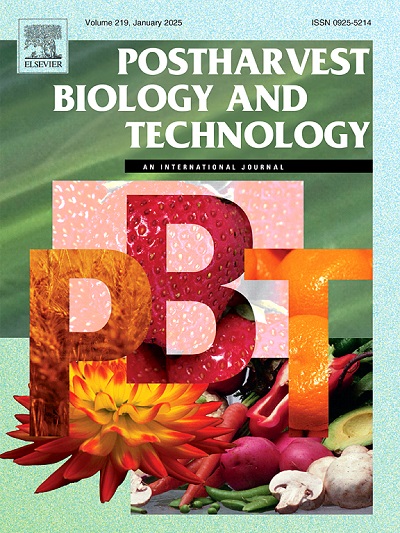Proteasome shuttle protein DSK2b regulates the enzymatic browning of potato
IF 6.8
1区 农林科学
Q1 AGRONOMY
引用次数: 0
Abstract
Potatoes are susceptible to enzymatic browning, which affects the processing and visual quality of potato produce. The proteasome shuttle protein DSK2b was screened to be interacted with two browning-resistant protease inhibitors and DSK2b exhibited higher expression in browning-resistant potato cultivar. Further experiments found that DSK2b expression increased with browning, suggesting a potential browning-regulatory role. Therefore, the effect of DSK2b on potato browning and related mechanisms was investigated by altering DSK2b expression levels. Results showed that DSK2b-overexpression alleviated the browning of potato pulps while RNA-interference of DSK2b aggravated the phenotype. DSK2b negatively affected the free amino acid accumulation, which contributed to potato browning. Besides, DSK2b negatively regulated phenylpropanoid metabolism by modulating key enzymes of PAL, 4CL, and C4H. Concurrently, DSK2b modulated the gene expression and activities of PPO and POD. Transcriptomic and proteomic analyses revealed that DSK2b regulated potato browning, which was closely related to protease inhibitors. This study suggests that DSK2b regulates enzymatic browning in potatoes, offering a novel strategy for mitigating enzymatic browning.
蛋白酶体穿梭蛋白DSK2b调控马铃薯酶促褐变
马铃薯易受酶促褐变的影响,影响马铃薯产品的加工和视觉质量。筛选到的蛋白酶体穿梭蛋白DSK2b与两种抗褐变蛋白酶抑制剂相互作用,DSK2b在抗褐变马铃薯品种中表达较高。进一步的实验发现,DSK2b的表达随着褐变而增加,表明可能具有褐变调节作用。因此,我们通过改变DSK2b的表达水平来研究DSK2b对马铃薯褐变的影响及其相关机制。结果表明,过表达DSK2b可减轻马铃薯果肉的褐变,而rna干扰DSK2b则加重了褐变表型。DSK2b负向影响游离氨基酸积累,促进马铃薯褐变。此外,DSK2b通过调节PAL、4CL、C4H等关键酶负性调节苯丙素代谢。同时,DSK2b调节PPO和POD的基因表达和活性。转录组学和蛋白质组学分析显示,DSK2b调控马铃薯褐变,这与蛋白酶抑制剂密切相关。该研究表明,DSK2b调控马铃薯的酶促褐变,为减轻酶促褐变提供了一种新的策略。
本文章由计算机程序翻译,如有差异,请以英文原文为准。
求助全文
约1分钟内获得全文
求助全文
来源期刊

Postharvest Biology and Technology
农林科学-农艺学
CiteScore
12.00
自引率
11.40%
发文量
309
审稿时长
38 days
期刊介绍:
The journal is devoted exclusively to the publication of original papers, review articles and frontiers articles on biological and technological postharvest research. This includes the areas of postharvest storage, treatments and underpinning mechanisms, quality evaluation, packaging, handling and distribution of fresh horticultural crops including fruit, vegetables, flowers and nuts, but excluding grains, seeds and forages.
Papers reporting novel insights from fundamental and interdisciplinary research will be particularly encouraged. These disciplines include systems biology, bioinformatics, entomology, plant physiology, plant pathology, (bio)chemistry, engineering, modelling, and technologies for nondestructive testing.
Manuscripts on fresh food crops that will be further processed after postharvest storage, or on food processes beyond refrigeration, packaging and minimal processing will not be considered.
 求助内容:
求助内容: 应助结果提醒方式:
应助结果提醒方式:


